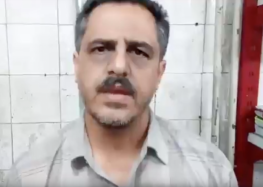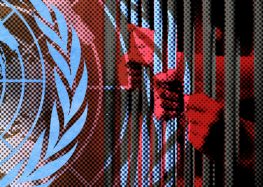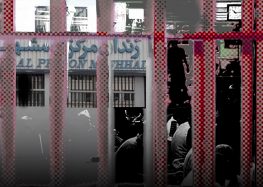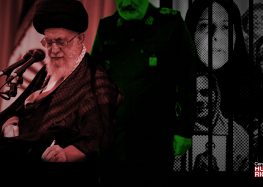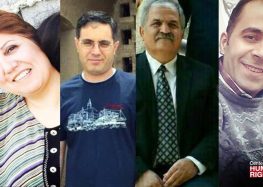Secret, Unannounced, Group Executions Continue Inside Iranian Prisons: At Least 14 More Executed Inside Mashad’s Vakilabad Prison
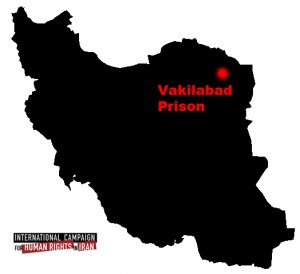 While Iranian authorities remain silent about the executions of drug traffickers inside Mashad’s Vakilabad Prison, the International Campaign for Human Rights in Iran has learned that seven prisoners were hanged on 11 August, and another seven were hanged on 20 September. According to information received from a source, the executions were carried out in groups. All those executed had been charged with drug-related crimes.
While Iranian authorities remain silent about the executions of drug traffickers inside Mashad’s Vakilabad Prison, the International Campaign for Human Rights in Iran has learned that seven prisoners were hanged on 11 August, and another seven were hanged on 20 September. According to information received from a source, the executions were carried out in groups. All those executed had been charged with drug-related crimes.
The source told the Campaign that in addition to the above two dates, at least two more group executions were carried out during summer 2011 inside Vakilabad Prison, but the Campaign has been unable to find additional details about these executions.
In a 22 June interview with ISNA News Agency, Mashad Prosecutor Mahmoud Zoghi confirmed the “high number of unannounced executions” inside Vakilabad Prison in Mashad. Without referring to the number and details of the executions in 2009 and 2010, Zoghi spoke of “implementation of five rounds” of group executions of drug-related convicts only “in the first three months of the [Iranian] year [21 March-21 June 2010].”
The Campaign previously reported on the executions of 12 prisoners on 29 June 2011 and 18 prisoners on 3 July 2011 inside this prison. The Campaign also reported the executions of 10 prisoners on 6 April, 12 on 13 April, 10 on 16 May, 12 on 23 May, 4 on 24 May, and 26 convicts on 15 June 2011.
In addition to Mashad’s Vakilabad Prison, the Campaign has been made aware of secret group executions of drug traffickers in many other prisons in Iran.
In addition to the executions at Vakilabad, the Campaign has also provided details of secret group executions inside Birjand Prison. On 25 June, Mohammad Bagher Bagheri, Deputy of the Southern Khorasan Justice Department, implicitly accepted the secret group executions of drug trafficking convicts inside Birjand Prison in Southern Khorasan Province. He did not refer to similar executions in 2009 and 2011, but only reported on the executions of “140 drug traffickers” in this prison in 2010. None of the executions mentioned by Mr. Bagheri had been announced before or during 2010.
The Campaign was also informed about widespread executions of drug-trafficking convicts inside Karaj’s Ghezel Hessar Prison. According to a source, these executions have remained in progress during the recent months. Sources that have been providing information about the group executions of Vakilabad Prison have reported similar methods for implementing death sentences inside Taybad, and Ahvaz Karoon prisons. Allegedly, most of those executed inside the Taybad Prison have been Afghan prisoners. Despite the Campaign’s reliable information about such executions in these prisons, due to existing limitations, we have been unable to find out more details about how the executions were carried out and the individuals executed.
In the recent months, Kurdish sources have repeatedly reported similar executions inside Orumiyeh Prison in northeast Iran. Several executions of drug-trafficking suspects have also been carried out inside Qom, Isfahan, and Zahedan Prisons, but they have never been announced by any authorities or official organizations.
The widespread executions which have taken place inside prisons all over the country are all carried out in secret, in groups, unannounced, extrajudicially, and arbitrarily. According to sources who have talked with the Campaign, the group executions inside Vakilabad Prison are carried out by putting convicts in a line in a roofless hallway leading to the prison’s visitation hall. The executions are carried out secretly, without the knowledge or presence of the prisoners’ lawyers and families, who do not find out about the executions until one or several days later. Even the prisoners themselves are unaware of their impending executions until a few hours before it is carried out.
The executions are unannounced because official governmental or judicial authorities never publish the details, numbers, names, or dates related to the executions, and never take official responsibility for the hangings. The Campaign believes that withholding official announcements of the said executions is a deliberate effort to conceal the actual statistics of executions in Iran.
Campaign sources have also said that these death sentences are usually issued at the end of often only in minutes-long trials, and that the suspects are deprived of a fair trial. Such conditions place these executions in the category of extrajudicial and arbitrary executions.
“A few specific branches within the Mashad Revolutionary Court review ‘several drug trafficking cases in each hour,’ without following procedures for a fair trial or without regard for current Iranian laws, and in many cases the widespread death sentence decisions are based only on reports from the Intelligence Office, the IRGC Intelligence Unit, or the Police Intelligence Unit, or with confessions extracted from the suspects under severe physical torture mostly inside police detention centers. Most, if not all of the widespread death sentences pertaining to drug trafficking suspects inside the Mashad Revolutionary Court are issued with only ‘a minutes long’ trial, without the presence of the suspect’s selected or court-appointed lawyers, and they are all upheld and carried out within just a few months,” a local source told the Campaign.
“In many cases, the death sentences for foreign nationals, and mostly Afghan suspects, are issued without observing the ‘right to access consular services.’ These suspects’ lack of familiarity with the court’s official language, Farsi, keeps them from comprehending the judicial process and answers to questions,” added the source.
In the Taybad, Birjand, and Mashad’s Vakilabad Prisons, dozens of Afghan prisoners and several Nigerian and Ghanaian prisoners have been executed. The Ghanaian and Nigerian Embassies have told the Campaign that they only learned about the executions of their citizens after they were carried out, through the Campaign reporter who called them. After the Campaign found out that a death row victim from the Philippines had been unfairly tried and sentenced to death, the Philippines Embassy in Tehran was informed about the prisoner, and this led to a fresh review of the convict’s case and his eventual release. Often, suspects and their families are never informed of the ruling from the Supreme Court that upholds the death sentences. The suspects are only informed of the final confirmation of their death sentences at the time of their execution.
Sources have told the Campaign that currently, hundreds of other prisoners are awaiting similar executions inside Vakilabad and Ghezel Hessar Prisons, as well as other prisons in the country.
The secretive and unannounced implementation of these death sentences inside Iranian prisons take place just as in the recent days the UN Special Rapporteur has reported secret group executions of at least 300 prisoners over the past year and at least 146 prisoners in the current year only inside Mashad’s Vakilabad Prison.
Earlier, UN Secretary General and other UN Rapporteurs had separately reported about the widespread, secret, group executions inside Vakilabad Prison. Iranian Judiciary authorities remain silent about unannounced executions in Iran.


